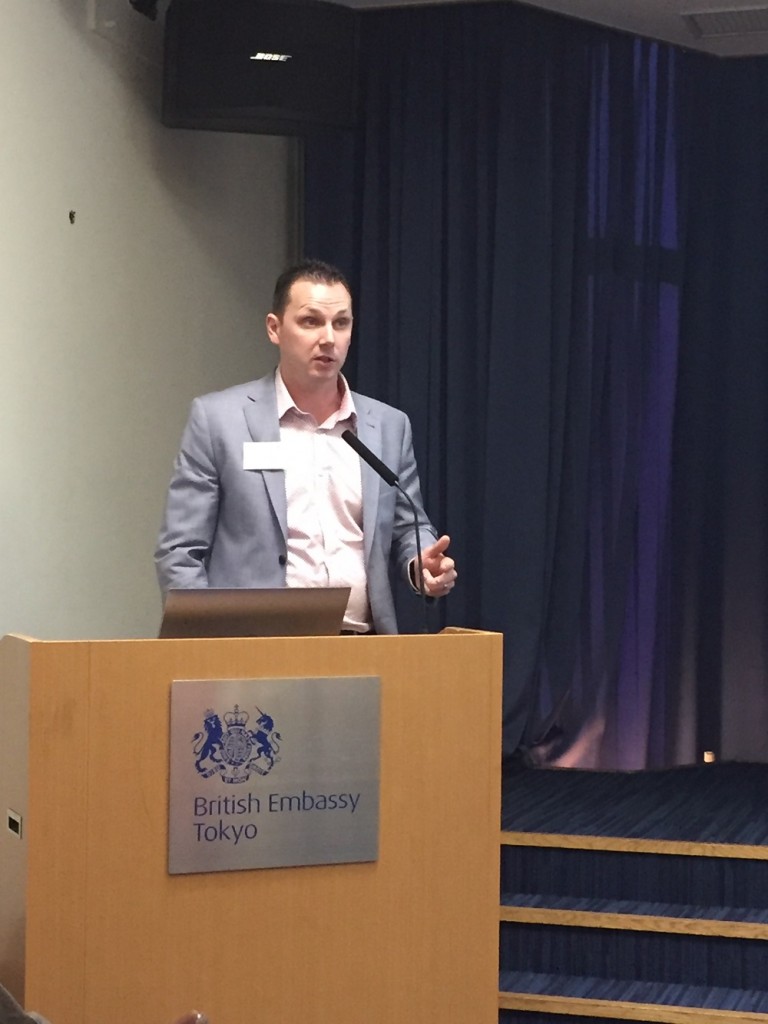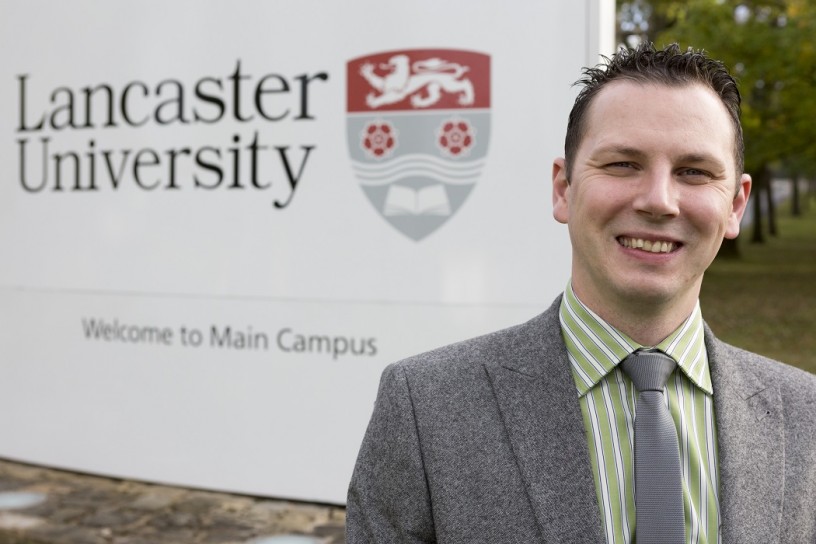In the spotlight:
Name: Jon Powell
Location: Lancaster
Occupation:
- Head of Enterprise and Innovation Services, Lancaster University
- Vice Chair and Director of Enterprise Educators UK
- Director of Lancaster District Chamber of Commerce
- Director of Employer Solutions Ltd
- Member of the Board for the Small Business Charter
You are an influential individual within the enterprise education space. What does ‘enterprise education’ mean to you, and why do you think it’s important?
Working in the Higher Education (HE) sector, we are predetermined to define everything. And this has been no different in the enterprise/entrepreneurship education sphere. Thankfully, in September 2012, the Quality Assurance Agency (QAA) published a guide for HE on “enterprise and entrepreneurship education” including definitions for the terms. This was written by experts in the field from Enterprise Educators UK (EEUK), the Higher Education Academy (HEA), the Institute of Graduate and Careers and Advisory Service (AGCAS) and many others. And it just so happens that the QAA and an army of volunteers are re-visiting this guidance and will be publishing an updated version in early 2018!
To me, and most of my peers, enterprise education is well defined as “having an idea and making it happen”, whereas entrepreneurship education is more focused on the specific context of “setting up a new venture, developing and growing an existing business, or designing an entrepreneurial organisation”.
It’s important because people want to develop an innovative and enterprising mindset; employers want to employ those people; and society needs more people who can make things happen.
How did you first become involved with enterprise education?
In the summer before the final year of my undergraduate degree I needed a job, so I applied for a paid placement through the STEP scheme to work with a self-employed individual. We got on well and I could see the value in what he was doing, but thought it could be applied differently so I suggested we start a company to commercialise it. I don’t know why. I had never been exposed to small businesses, never mind start-ups, before; I had not studied entrepreneurship at that point; and I didn’t know the first things about starting a business. But we did it and started a company.
I asked around the university and there wasn’t any practical start-up help available, but I figured there must be other students starting businesses so I decided to start a Student Entrepreneurs Society. I never thought to ask if there was a problem I was trying to solve outside my own…
I convinced someone in the Business Enterprise Centre to give me some money to help me start the society; I convinced the university data protection office to give me a database with the home address of every student studying at the university; I learnt about mail merge in Word; and I sent around 5000 letters targeting undergraduates not in their final year. It cost hundreds of pounds in stamps and took me weeks. But there was enough interest, so I hosted an introductory meeting, established a society leadership team and the society was born. I was offered an admin job in the Business Enterprise Centre as they must have seen something they liked in me and the rest is history. I believe the Entrepreneurship Society was one of the first in the UK. I was offered a full time job by the university when I graduated after a master’s degree and, a few years later, we secured some funding to start a project to coordinate our enterprise and entrepreneurship education offer and the Enterprise Team was formed in 2009. I’m still working at Lancaster University today.
How has enterprise education changed over the years, and how does it benefit students today?
I’m not an enterprise education historian but I’d say that, in most institutions, it started as a curricular-based study of entrepreneurs and entrepreneurship rather than a study or support towards entrepreneurial endeavour. The landscape today is completely different, with universities offering degree programmes with the expected aim of creating a new venture, and most universities providing practical support and entrepreneurship education within and outside the curriculum. Embedding enterprise education is now common practice from degrees in Archaeology to Zoology and everything in between. We still have a long way to go for this to be universal, but the roadmaps are there and the case studies of good practice and teaching pedagogies are more visible than ever.
Students today can benefit through the development of their skills, their mindset and their entrepreneurial effectiveness. They don’t need to plan on becoming an entrepreneur to benefit from engagement in an entrepreneurial learning journey. Social entrepreneurship, intrapreneurship, and innovative and design thinking are now common language amongst career professionals and students. And, of course, all of these factors support graduate employability.

Jon Powell speaking at the British Council in Japan
When students arrive at Lancaster University, do they have a good grounding in enterprise, or do you think our education system needs to start introducing these ideas at an earlier age?
Some have an interest, but few seem to have had much exposure.
I can count on one hand the number of students I know who chose to come to Lancaster University because of our entrepreneurship support offer. Whilst enterprise and entrepreneurship education has become part of the landscape in Higher Education, it is still given relative lip service in 11-18 education. Even old-fashioned career support and work experience has fallen foul of the ever-increasing pressure on schools to focus on league tables, English and Maths GCSE pass rates, the English Baccalaureate and a culture of “teaching by numbers”. Most of our students still arrive with the mindset that success is measured in getting a good degree and a graduate training scheme position. They don’t seem to understand that 99.3% of potential private sector employers are small businesses, or that working for yourself is a viable career option. Unfortunately, the main role models that 11-18 students see outside of their family group is their teacher (working for the local authority), who is then (if they are lucky) asked to teach them about entrepreneurship and/or starting a business (teaching them to swim having never been in the water). I’m not bashing teachers, I’m married to one, but the system teaches the creativity and innovation out of students; it certainly doesn’t help them prepare for working life.
Of course, the picture above applies mainly to students that have come through the English education system. We tend to find our international students are twice as likely to engage with our central enterprise support offer.
You are Head of Enterprise and Innovation Services at Lancaster University, supporting students, staff and alumni of the university to make things happen. Indeed, when it comes to enterprise and innovation, you say that the “important thing is to act”. How do you facilitate this for your members?
Our role as enterprise educators is to create an environment for people with ideas to flourish. We are custodians of the entrepreneurial ecosystem at our universities. What does that look like? Well, it’s hard to say as it differs from university to university. At Lancaster, we try and support activity in many ways, for example:
– Regular learner driven labs where students can bring problems, challenges and their own learning objectives. These are the touch points for our different models of intervention and support.
– Awards and events to have a go. These can be for a project, a social enterprise, a start-up, a course, some kit etc. Small pots of funding to try things, to test and learn.
– Communicate and celebrate. Keep students, staff and alumni informed of what is going on, the opportunities on campus and further afield, and shine a light on activity, effort and success.
Obviously we will support individuals or teams with mentoring, coaching and access to more in-depth financial support where it’s needed, but that is the small end of the pipeline. We aren’t just here to support start-ups.
There’s an age-old debate about whether entrepreneurs are born or made. Can you weigh into this?
I remember studying this in early noughties. At that time, I would have sat on the fence and said it’s a bit of both. But that was based on my assumption that ‘entrepreneur’ solely meant a financially successful individual who started a business. Now, I’d say an entrepreneur is a doer who sees an opportunity for change and makes things happen. I’ve seen entrepreneurs from all walks of life, all backgrounds. For me, it’s a mindset. I don’t believe we are born with a particular mindset; I believe that it is nurtured. And it can be in a state of flux. Everyone has the potential to be an entrepreneur at some point in their life. For some, it comes easily with little external help; for others it’s buried deep and may never surface in action if the situation and circumstances don’t align. Can entrepreneurship be taught? Wrong question. It can be nurtured.
For students who don’t want to be entrepreneurs, what other benefits does enterprise education provide?
Most students don’t want to be entrepreneurs. But they can still benefit from developing an entrepreneurial mindset. If we took the words “enterprise” and “entrepreneurship” out of our dictionary we would still be doing the same things: developing innovative or design thinkers who want to make a change and make a difference to society. Too many people spend too long being caught up in the language. Just do something, people. No one asks you about all the stuff you didn’t do in an interview…
Where do you hope to see enterprise education in five years’ time?
We are certainly moving in the right direction. We have seen policy actually helping enterprise educators in the last few years. The recent announcement of the Knowledge Exchange Excellence Framework (KEF or KEEF or KEITH depending on who you speak to) to join with the Research Excellent Framework (REF) and Teaching Excellent Framework (TEF) may put enterprise education and wider knowledge exchange activities on a par with research and teaching. Enterprise education truly delivers against all of these strategic priorities, and we all know what gets measured gets funded. So, in five years, I hope to see enterprise education being a core funded activity that is a norm in universities, not an add on funded by external money or projects.
There are some key organisations including Enterprise Educators UK that have to work hard on behalf of the sector towards this aim. I’m an optimist, so I expect to see a larger network of educators, more collaboration, and an increased international focus. I expect to see other countries invest in enterprise education and create the infrastructure and ecosystem we have developed over the last 15 years in the UK.

Jon Powell… or James Bond?
What does a typical day look like in the world of Jon Powell?
Of course there is no such thing as a typical day. I’m a portfolio worker, with a full time job. But a day this week would probably have been:
– 2-year-old wakes me up at 6.30am. My wife has already gone to work.
– Get showered whilst singing along to “wheels on the bus” whilst said 2-year-old shouts instructions.
– Get dressed, head downstairs, make breakfast and watch the latest episode of Paw Patrol on Milkshake (if you know the names of these programmes then buy me a beer next time you see me – you know I’ve earned it!).
– Dress the 2-year-old, brush hair, feed the fish, the tortoise and the rabbit.
– Drive to work and catch up on the news via Radio 5 live. Drop the 2-year-old at preschool.
– Get to the office for around 9am, have a brew, look at the 1000 unread emails and gulp.
– The day will mostly be spent in meetings – ideally walking meetings if it is just one-to-ones with colleagues, huddles (where everyone only gets one minute to update the others), and a few more formal meetings interspaced with an hour or two dealing with any urgent emails.
– If it is a Thursday, it’s a good day, as I will buy some Thai food from Two Thai, one of our graduate start-ups that received an endorsement for a Tier 1 graduate entrepreneurship visa.
– Once a week I will have an evening meeting, usually a board meeting for one of the organisations I’m involved in. If that is the case, hopefully I made arrangements for someone else to collect the 2-year-old. If not, then I’ll be collecting from preschool at 5.30ish.
– Get home, play cars with daughter, run around and have fun before helping get her to bed then start cooking tea (usually a Hello Fresh meal).
– Eat tea around 9pm then head into the outdoor hot tub for 30 minutes to relax and sometimes read before heading to bed around 9.45/10pm.
The only things I’d like change are to receive less emails, and to have fewer meetings. I’m working on both through changing strategies and formats for communications. Any ideas, please let me know!
And finally, Jon, tell us: if you were an animal, what would you be and why?
I’m fairly well know at Lancaster for asking bizarre interview questions, but this one was new to me and I was a little stumped. So I asked my 2-year-old what she wanted to be when she grew up. She said a big fat wood pigeon. We didn’t really get to the bottom of why.
Cover Image: Nick Dagger Photography©





Leave a Reply